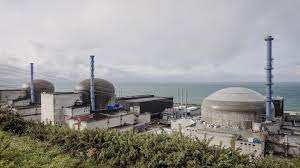
Campaigners fight on with legal action against go-ahead for Sizewell C Nuclear Power Station 10.07.23
Campaigners will continue fighting the decision to give the go ahead to build Sizewell C Nuclear Power Station which EDF claims will produce electricity for 60 years in the heart of Suffolk Coast and Heaths Area of Natural Beauty, principally on the issue of a permanent water supply.
Together Against Sizewell C Limited (TASC) says it is clear a desalination plant will be needed to guarantee a permanent water supply for Sizewell C. However such a plant was not included in the planning application for the nuclear power plant and therefore was not assessed and taken into account when then Business Secretary Kwasi Kwarteng decided to give development consent to the 3.2 gigawatt power station against the advice of the planning Examining Authority.
TASC was refused permission for judicial review of the Business Secretary’s decision. Now the group has applied for permission to appeal against that High Court ruling, arguing that the judgment by Mr Justice Holgate was wrong in law.
In its application for judicial review, TASC said the issue of a water supply should not have been treated as a separate issue to the power plant application.
It says the judge was wrong to say that NNB Generation Company (SZC) Limited was “unable to identify a permanent supply of potable water”. The company could at any time have decided to proceed with a desalination plant but, instead, chose to keep open the option of a supply provided by Northumbrian Water Ltd (NWL). Also, if Sizewell C did rely on NWL for its potable water, the scale and location of the power station would necessitate additional infrastructure and the impacts of this, including harm to European Sites, have not been assessed, let alone ruled out.
TASC adds the judge was wrong:
• To find the permanent desalination plant need not be assessed because it was not the preferred option.
• To say “there was no option to assess”, ignoring the possibility for choosing and assessing the impact of a permanent desalination plant
• To find the fact that the water supply was not part of the application was something the Business Secretary was entitled to take into account.
• To find there was no functional inter-dependence between the water supply and the power station.
• To find there was no basis to find that the Business Secretary was irrational to judge that the power station and its water supply were separate projects
• To say that there is no principle under the Habitats Directive requiring assessment at the earliest possible stage
• Not to deal with TASC’s submission that the permanent desalination plant option could have been assessed.
TASC says the judge stepped into the merits of the application when he said the question of alternatives had been resolved by national policy EN1 and EN6 meaning there is thus an urgent need for new nuclear energy generating infrastructure of the kind proposed at Sizewell. He repeated this error when he drew on information about Hinkley Point C in rejecting TASC’s application.
He was wrong to find there was a rationally sufficient evidential basis to support the conclusion that the power station would contribute to electricity generation by 2035. TASC says the material on this was threadbare.
He did not deal with TASC’s complaint that the site would be clear of nuclear material by 2140, when the evidence showed a much later date.
Together Against Sizewell C (TASC) Chair Jenny Kirtley said: “It is imperative we appeal Judge Holgate’s perverse sanctioning of Sizewell C even though the proposed nuclear plant does not have a guaranteed mains water supply, without which it cannot operate. We also appeal his ruling on EDF’s incomprehensible claim that the Sizewell C site will be fully decommissioned by 2140. This date has been flatly contradicted by the Office of Nuclear Regulation, who told TASC it will take 70 years after the plant stops generating for spent fuel to cool sufficiently, be moved offsite and the store decommissioned [note 1]. The only way the 2140 deadline could be met at Sizewell C would be to slash its operating life by nearly 30 years, meaning generation stops in 2070, driving a coach and horses through this project’s claimed commercial viability and contribution to meeting the UK’s climate change goals.”
Paul Collins Chair of Stop Sizewell C said: “We are fully committed to supporting this appeal and we believe the issues speak to critically important points of principle. How can it be right to allow a nuclear power station that has no identified potable water supply, in the UK’s driest region, to go ahead? And is it not downright dangerous to have disputed dates about how long Sizewell C would need protection from accelerating rising sea levels, on a Suffolk coastline increasingly subject to erosion?”
Rachel Fulcher from Suffolk Coastal Friends of the Earth said: “ Suffolk Coastal Friends of the Earth wholeheartedly support TASC in pursuing the appeal against Judge Holgate’s decision and have every confidence that the legal team will achieve a successful outcome. Meanwhile we will continue to focus on saving what we can of East Suffolk’s precious wildlife and our beautiful Heritage Coast which are already being devastated by EDF’s so-called ‘preliminary works’.”
Leigh Day solicitor Rowan Smith said:
“We are proud to represent TASC in the local community’s continued fight to help protect Suffolk’s heritage coast and wildlife sites. Our client is understandably disappointed by the High Court’s ruling. We consider that it is legally flawed in a number of respects and are hopeful that the Court of Appeal will grant permission for another hearing into these extremely important issues.”
TASC is fundraising towards the costs of the legal challenge: https://www.crowdjustice.com/case/save-suffolks-heritage-coast-w/
Note 1. TASC’s DCO submission REP8-285a ‘Deadline 8: Oral representations & comments regarding ISH 11 Flooding, Water & Coastal Processes’ reference Agenda item 3b) and Annex A. This is supported by the ‘generally expected’ 160 year full lifetime of a nuclear site set out in the Environment Agency and ONR’s joint advice note, ‘Principles for Flood and Coastal Erosion Risk Management Office for Nuclear Regulation and Environment Agency Joint Advice Note’ – see Appendix A on page 10. EDF’s own DCO documents show the project could not meet the 2140 deadline, see NNB GenCo /EDF’s DCO submission APP-192 para 7.7.92 and DCO submission APP-189 para 5.1.5

